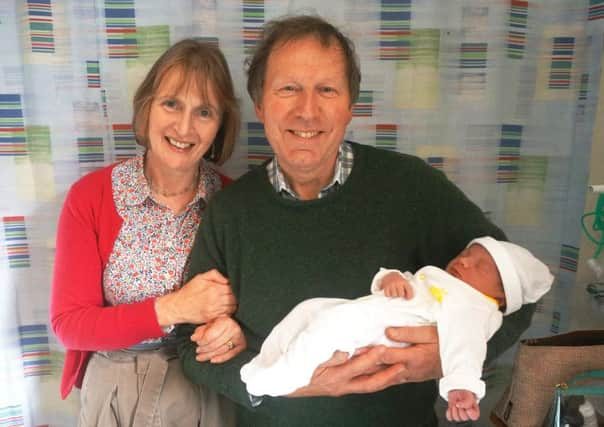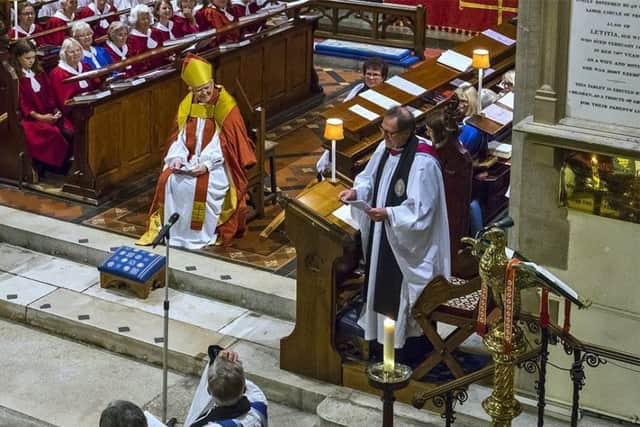After 44 years top cleric says he will probably leave Province for good


He was until recently the dean of St Anne’s Anglican Cathedral, but as he approaches retirement he has swapped his Belfast ministry for the more sedate surroundings of semi-rural south-west England.
Here he looks back on his time in the Province, and forward to what the future may hold for the Church of Ireland, and the country at large.
Advertisement
Hide AdAdvertisement
Hide Ad“It’s an entirely different sort of ministry altogether,” he said of his new patch, the tiny Dorset town of Swanage and its surroundings.


“It’s a holiday, sea-sidey ministry. There’s lots of caravans and second homes. It’s a bit like Newcastle or Portrush.
“Some people would look on this very much as a sort of step down. I don’t look at it in those terms.
“It is time for something different for us.”
Born in London, the 62-year-old’s soft southern English accent contains no hint of an Ulster inflection despite having lived here ever since enrolling in Queen’s University Belfast in 1973 (where he initially studied pharmacy, before radically changing tack and opting for theology).


Advertisement
Hide AdAdvertisement
Hide AdHis career began when he was ordained in the largely-loyalist parish of Cloughfern, on Belfast’s northern edge, in 1979.
He then served in east Belfast, Ballyrashane in north Antrim, Cloughfern again, and south Belfast, before becoming dean of St Anne’s in 2011.
In all, since 1979 he has spent only about five years outside Northern Ireland, during a stint in Hampshire.
In recent times he and his wife Helen (who comes from the Isle of Man) had begun asking themselves: “Is this is it for the rest of our lives – or are we going to move back to England?”
Advertisement
Hide AdAdvertisement
Hide AdHe estimates that he has maybe about another five years of ministry left, then must decide where he will retire.
And whilst he has been reluctant to sever his Northern Ireland ties (he still owns a bungalow in Portrush, and continues to check the Northern Irish news every day), his son David and daughter Rowan both now live in England, and “it is probably less than likely” he will spend his retirement in the Province.
WHAT NEXT FOR THE CHURCH OF IRELAND AT LARGE?
As to what might become of the Church of Ireland which he has now left behind, he noted that churches generally are suffering from dwindling and ageing congregations, adding that Anglican parishes in north and west Belfast in particular are under “real pressure”.
However a raft of other areas too are being forced to contend with “too many church buildings to maintain, with fewer people attending church and less resources”.
“The church has to make difficult decisions,” he said.
Advertisement
Hide AdAdvertisement
Hide Ad“Probably some more churches will have to close and congregations amalgamate.”
Does he ever see a time when St Anne’s Cathedral itself will be deemed surplus to requirements?
“No, I don’t,” he said.
“It’s essential to the city. In a way the Church of Ireland actually could manage without St Anne’s. It’s got quite enough churches.
“But for the city of Belfast, if you need a big civic space where you require a service, then where else can you use?
Advertisement
Hide AdAdvertisement
Hide Ad“The Ulster Hall wouldn’t be the same, the Waterfront Hall wouldn’t be the same. In a way that’s why it was built.
“Of course to maintain and run a building like that costs a huge amount of money and that will be one of the really big challenges over the next decade – that St Anne’s can become resilient to the kind of financial pressures that are the reality of today.”
To aid this endeavour, the cathedral nowadays has a “business arm” employing two people, who aim to generate revenue from events, tourism, and the cathedral car park which stands close to the city centre.
During his 44 years in the Province he has conducted funerals for Troubles victims, but said that he has also witnessed “great moments of reconciliation”.
Advertisement
Hide AdAdvertisement
Hide AdWhen asked what he will not miss about the place, he replied: “I think the sort of political deadlock we’ve seen in Norther Ireland.
“I’ll not miss that one bit! At times it’s so depressing to see.
“But I’m always hopeful. I think that there’ll be a breakthrough one day.”
‘A GAY BISHOP? NEVER SAY NEVER’
As to whether he can foresee a day when the Church of Ireland (which he has now departed for the Church of England) will ordain gay clergy, even a gay bishop, Rev Mann said: “I think it’s a situation of never say never, really.
Advertisement
Hide AdAdvertisement
Hide Ad“One doesn’t know what the future holds. I’d certainly say it’s very, very unlikely at the moment. But I’m away from the scene now.
“Like most people, I think I find it quite difficult to see where the steps forward will go.”
Churches “need to respond pastorally to people that are feeling excluded,” but “to resolve the theological differences is going to be extremely difficult... with sensitivity, we hope we can move closer towards resolving these questions”.
When asked what he will not miss about Northern Ireland, he replied: “I think the sort of political deadlock we’ve seen in Norther Ireland.
“I’ll not miss that one bit! At times it’s so depressing to see.
“But I’m always hopeful. I think that there’ll be a breakthrough one day.”